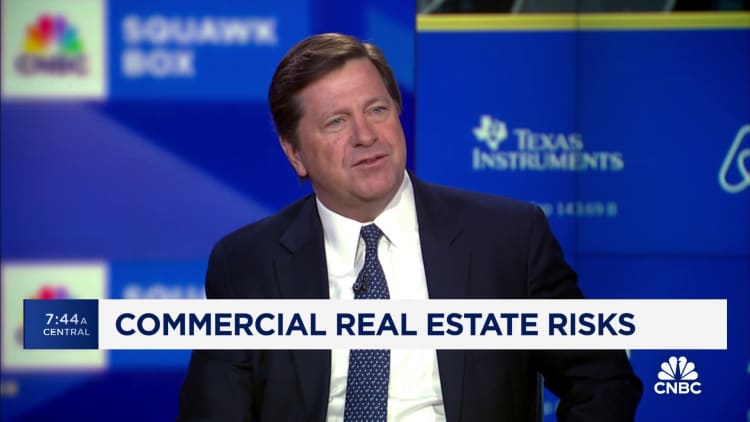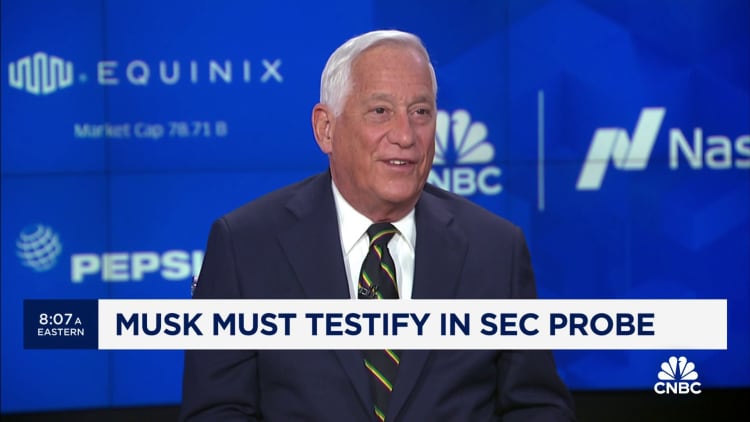Elon Musk, owner of Tesla and the X (formerly Twitter) platform, attends a symposium on fighting antisemitism titled ‘Never Again : Lip Service or Deep Conversation’ in Krakow, Poland on January 22nd, 2024.
Beata Zawrzel | Nurphoto | Getty Images
It remains to be seen what Tesla will do about Elon Musk’s pay just a few weeks after a Delaware judge voided his $56 billion compensation package, the largest CEO pay package in public corporate history. But Musk has already made some big decisions, including a declaration of a war on the state of Delaware as the place for companies to be in business.
“Never incorporate your company in the state of Delaware” Musk posted on X shortly after the court decision. After an X poll supporting his position, Musk said Tesla will hold a shareholder vote to incorporate in Texas. The electric automaker has not issued an SEC filing notifying shareholders of that plan to date, but this week, Musk moved two of his companies out of the state. On Wednesday night, he said in an X post that SpaceX had reincorporated in Texas and again urged other companies to stay away from Delaware as a legal corporate home. Earlier in the week, the state of incorporation for brain implant company Neuralink was moved to Nevada (where X has been based since he took the company formerly named Twitter private).
Tesla’s board, which Delaware Chancery Court Chancellor Kathaleen McCormick said in her ruling had failed to prove “that the compensation plan was fair” or show much evidence that they had even negotiated with him, has been quiet following the decision. But one thing is certain: the Delaware court decision is set to have wide-ranging corporate governance implications. More than 60% of the Fortune 500 is incorporated in the state.
“This was something that was never done before, as [McCormick] noted, but it was, in fact, time to do it; it was the perfect storm,” said Charles Elson, founding director of the Weinberg Center for Corporate Governance. “It’s a seminal case.”
The case, and Musk’s subsequent reaction, raise several questions about the future of corporate board and executive relationships, and whether Delaware will remain as the de facto home for big businesses.
CEO pay and board independence
Key to the Delaware court’s decision was Musk’s relationship with board members, with McCormick writing in her ruling that Musk had “extensive ties” with the people who were negotiating for Tesla on the package, including members of management “who were beholden to Musk,” among them General Counsel Todd Maron, his former divorce attorney. A recent Wall Street Journal report included some inflammatory allegations about how far those board relationships bled into Musk’s personal life.
“Put simply, neither the Compensation Committee nor the Board acted in the best interests of the Company when negotiating Musk’s compensation plan. In fact, there is barely any evidence of negotiations at all,” she wrote.
Elson said the rules regarding director and committee independence “were always a little loose,” often just simply asking if directors are employees or consultants.
In this instance, McCormick looked at independence “in a much more nuanced way than typically Delaware has done,” Elson said. “We’ve been moving in that direction, but she got us there.”
“There’s going to be much more concern about real independence on the board, and the process by which there’s negotiation,” he said. “It will certainly force boards to be more independent in reality, and to really be more careful with the process by which they reach compensation.”
Elson said one of the issues in this instance was that due to Musk’s outsized pay package, other CEOs in and outside of his peer group were able to make demands based on it. He now expects that practice to stop, as “that kind of grant will not happen because of fear of that kind of challenge.”
Total compensation for S&P 500 CEOs has steadily risen in recent years, hitting a mean of $15.4 million in 2023, according to data from The Conference Board and data analytics firm ESGAGUE.
But even as those figures have risen, Musk’s compensation would be an “outlier among outliers,” said Matteo Tonello, managing director at The Conference Board.

However, Tonello noted, that even with the rise in total compensation, successful challenges on say-on-pay votes have declined. Furthermore, he said, even after a successful say-on-pay vote, “the likelihood that a compensation package would be challenged in court is even lower.”
In Tesla’s 2018 CEO compensation package, the board awarded Musk a dozen tranches of stock options that would finish vesting in 2022, based on several milestones, including stock price increases.
Between the beginning of 2018 and the end of 2022, Tesla shares soared almost 500% as Musk promised to turn Tesla into not just a dominant EV brand, but a robotaxi company and solar juggernaut, among other things. The S&P 500 gained 44% over that stretch, while the Nasdaq rose 52%.
Former SEC Chairman Jay Clayton said on CNBC’s “Squawk Box” this week that while it “was an outsized, unique pay package that at the time seemed nearly impossible,” shareholders did also benefit from Tesla’s “remarkable rise.”
“Judging with hindsight, you’ve got to be really, really careful,” Clayton said. “That’s why Delaware has lasted so long because process protects judgments from 20/20 hindsight, and substance is important.”
Texas, Nevada challenges to Delaware
Musk’s high-profile campaign to move companies out of Delaware adds to mounting challenges from other states in recent years to dent Delaware’s reputation as the first choice for incorporation.
Musk’s post suggesting Tesla would move from Delaware was well received by Texas Governor Greg Abbott on X, who has looked to challenge Delaware’s position as the preeminent business court in the U.S. Last June, Abbott signed a law that would establish business courts in the state to deal with complex commercial disputes. Those courts will open in September.
Former U.S. Attorney General William Barr also called for companies to move away from Delaware in a November WSJ op-ed, claiming that the state’s courts are “embracing ESG, which rejects shareholder value as corporate law’s lodestar.” In exchange, Barr suggested companies consider Texas, Georgia, Utah, or Wyoming, all of which now have their own designated business court.
Walter Isaacson, the former CNN CEO who wrote Musk’s biography, said on “Squawk Box” on Monday that if the Delaware Supreme Court doesn’t overrule this decision “it’s going to hurt Delaware…because people will say, ‘Wait, you mean five years after something happens, eight years after something happens, you’ll go back and undo it?”‘
While Isaacson said he understands why people are upset at Musk, “I can’t see how you take the guy’s compensation five years after [it was] granted and say the deal that 75% of stockholders made, just revoke that and take the money away.”
Fortune 500 exodus not likely, experts say
Both Elson and Tonello are skeptical about any Delaware exodus stemming from this decision.
“Delaware has been the primary state of incorporation in the United States for several decades, due to a business-friendly corporate law and a specialized court that can decide on corporate disputes expeditiously and without a jury. This has led to an extensive body of case law that is appreciated even by large institutional shareholders.” Tonello said. “Even when shareholder approval is not required by organizational documents, a board of directors of a publicly traded company most likely would want to seek shareholder approval of a critical organizational decision such as reincorporating in another state. The decision could in turn trigger a shareholder lawsuit.”
Elson noted that while there are several states now vying for companies not incorporating in Delaware, it’s nothing new, as North Carolina, North Dakota, Nevada, Michigan, and others in the past have tried to do.
Delaware’s continued advantage comes down to a few factors, Elson said, including a superb corporate law statute, a deep bench with corporate law expertise, and a body of law in this area that far surpasses any other state.
But perhaps most importantly, Elson said, is that “there is no hometown advantage. There isn’t much else going on in Delaware other than corporate regulation, and so it’s viewed by investors and managers as neutral.”
In 2022, the Delaware courts ruled in favor of Musk in a shareholder lawsuit over Tesla’s $2.6 billion acquisition of SolarCity. Tesla shareholders alleged the company’s acquisition of the solar installer amounted to a bailout, pushed through by Musk who sat on both company boards at the time. The shareholders also alleged that Musk controlled the board of Tesla, even though he appeared to recuse himself from some deal negotiations concerning SolarCity.
Had he lost, Musk could have had to pay upwards of $2 billion.
“Whether you like or dislike an opinion, it will be smartly thought out and not biased towards one group or another,” he said. “They tend to call them as they see them.”

Read the original article here
